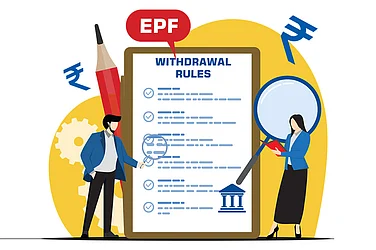I was recently going through the survey results on divorce in India, conducted by 1 Finance, a financial advisory firm. The sample size consisted of 1,258 individuals residing in Tier 1 and Tier 2 cities in India. A balanced representation was given to male and females, and the respondents were from diverse professional and educational backgrounds. The common factor was that either they were divorced or in the midst of divorce proceedings.
Now obviously, there could be multiple reasons for divorce. However, I shall restrict myself only to the monetary ones.
Before couples get married, they discuss numerous issues—whether to have children, and if yes, how many, and the timeframe for starting a family. Which city to live in, and if they have any aspirations to migrate. In-laws residing with them is another issue. It never fails to amaze me that financial discussions are completely overlooked. The excitement of the wedding and the magic of the honeymoon will wear off quickly, leaving you with stark reality.
No one is asking you to draw up a pre-nuptial agreement, but surely there are issues that must be faced. Ignoring fiscal issues or sweeping them under the carpet can cause deep fissures in a marriage. According to the survey, fights over money were commonplace. At least once in 15 days there were financial arguments (64 per cent of the females and 75 per cent of the males said so), and the number shoots up alarmingly when it comes to once a month (89 per cent and 93 per cent, respectively).
Leave no room for ambiguity when it comes to managing finances. Your choices now impact your spouse and your children
Can you imagine the discord in the house because of this? And is it surprising that it will eventually lead to a breakdown in relationships? The survey mentioned 42 per cent of men stating “financial issues” and 43 per cent of women citing “financial disparity” as the cause of their divorce.
No one gets married with the idea of getting divorced. Divorce has huge mental, emotional, societal and psychological repercussions. It has financial repercussions, too. So is it not wise to discuss money issues before marriage, along with the other issues that are usually discussed?
Here are some areas that need to be brought to light before any individual commits to another in marriage. Lack of honesty on any of them will only lead to mistrust and resentment. Leave no room for ambiguity when it comes to how finances should be managed, because this is no longer about your income and your debt or you and your parents. Your choices now impact your spouse and your children. For instance, if you have to support your parents, it would mean less disposable income for your wife and children. This is not about good or bad, or right or wrong. It is just about transparency and awareness.
Here are some crucial financial issues that could be a core contributor to marital dissolution.
Asset And Liabilities
List all the loans being serviced. This could be towards a financial institution (personal loan, home loan, education loan, vehicle loan, and so on), credit card debt or money owed to family or friends. A full disclosure means stating the amount due, and whether or not the individual is on track as far as repayment is concerned. Conversely, also come clean as to whom you have lent money to and if you hope to get it back. Remember, marriage is a partnership where all these details matter.
List the assets each one currently has. This could be a bone of contention because some may prefer not disclosing what was earned before they got together. However, if you do have assets, is there any reason you are not able to clear your current debt and bringing that into the marriage? And going ahead, should bonuses or windfalls be used to clear the debt?
Earnings
This has two angles.
Be prepared for compromises and adjustments. Take help of a financial advisor if you’re not making any headway
The first is how much each partner is earning and how much of it goes towards servicing the debt. It may sound very unromantic, but the more stressed you are about money, the more the peace in the house gets disrupted. All the survey respondents with negative net worth reported financial arguments (100 per cent). The frequency of conflict dipped to 63 per cent for couples whose net worth was at least Rs 50 lakh.
The second is whether or not the woman will continue to work after the birth of her child. A friend told me that she will work as long as the home loan has to be paid. Once that is cleared, she plans to quit her job. Another told me that she would love to be a stay-at-home mom, but the fees and the extracurricular activities are way too expensive to provide for on one person’s salary.
Obligations
Do any of the parents have to be supported? If yes, how much? Is anyone expected to pay for their younger sibling’s education or wedding? I know a lady whose daughter works abroad. When the latter’s husband said that he would like to give his mother a monthly allowance, she said she too would like to give one to her mother. So each of them give a little bit to their respective mothers every month.
Management
What should be the savings target every month? How will the investments be managed? Should they together pool for retirement and child’s education?
How will the expenses be managed? Will they have a joint account where each contributes towards the running of the house? If yes, how much must each put in? Will it be equal amount or a percentage of the salary? According to the survey, 7 per cent declared that the household expenses were managed entirely by the wife and, 43 per cent stated that it was managed entirely by the husband. Only 26 per cent equally shared and 24 per cent unequally shared the expenses.
One couple I know (who have no children) split their expenses. One pays for the rent, the other pays for all the monthly expenses. This works for now as the rent is quite high in Mumbai. Should they move out of the city, they will revisit and reassign the expense load.
Immediate Expenses
If the parents are not paying for the wedding, what should be the wedding budget? How much should be budgeted for the honeymoon? Should an emergency fund be created soon after marriage? If yes, how much should it be and should it be an equal contribution? What are the big purchases that need to be made within a year of marriage? Should term life insurance policies be taken out?
So many questions! It may sound intimidating, but your future self will be grateful for the clarity. Don’t expect your partner to think alike. So be prepared for compromises and adjustments. And take the help of a financial advisor if you are not making any headway.
By Larissa Fernand, Behavioural Finance Expert













